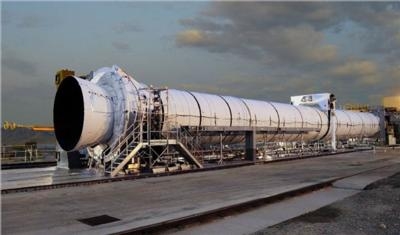Mon, Sep 11, 2017
Important Step Towards First Flight In 2019
Orbital ATK, a global leader in aerospace and defense technologies, recently completed an important qualification test of the avionics system for the solid rocket boosters the company has developed and is now manufacturing for NASA’s Space Launch System (SLS). Completion of this milestone is an important step toward preparing the SLS and Orion spacecraft for their first flight in 2019. Two Orbital ATK-developed five-segment rocket boosters will be used on each SLS launch to help provide initial thrust for the first two minutes of flight.

The avionics system is considered the “brains of the booster” as it starts booster ignition, communicates with the SLS launch vehicle computers during flight, and initiates booster separation upon completion of the first stage burn. The system is now qualified as meeting NASA’s demanding human-rating requirements, which provide a level of redundancy to ensure a safe flight environment through various phases of lift-off, ascent and staging.
“Completion of booster avionics system qualification is a significant step forward in supporting overall vehicle qualification and launch of the first flight of SLS – Exploration Mission-1,” said Jeff Foote, Vice President of NASA Programs for Orbital ATK’s Propulsion Systems Division. “We are proud of this accomplishment and look forward to completing full certification of the booster later this year.”
Qualification of the booster avionics system included a rigorous and comprehensive test series that thoroughly verified the fidelity of the system in a variety of expected and abnormal conditions. Key interactions confirmed during qualification testing included the ability to initiate booster ignition, control the booster during flight, and terminate flight.
The Space Launch System is NASA’s new heavy-lift launch vehicle that is being built to take crew and cargo to destinations beyond earth orbit, including to cislunar space and eventually Mars. SLS, along with the Orion spacecraft, will enable human exploration on a variety of missions to deep space. It has the greatest capacity of any launch system ever built, ensuring continued American leadership in space exploration.
(Image provided with Orbital ATK news release)
More News
Pilot Also Reported That Due To A Fuel Leak, The Auxiliary Fuel Tanks Were Not Used On June 4, 2025, at 13:41 eastern daylight time, a Piper PA-23, N2109P, was substantially damage>[...]
From 2023 (YouTube Edition): Reflections on War’s Collective Lessons and Cyclical Nature The exigencies of war ought be colorblind. Inane social-constructs the likes of racis>[...]
Pilot Reported That He Was Unfamiliar With The Single Seat Amateur-Built Airplane And His Intent Was To Perform High-Speed Taxi Testing Analysis: The pilot reported that he was unf>[...]
From 2023 (YouTube Edition): First Kits to Ship October 2023 Having formerly resurrected the storied shape of the Ryan ST—in effigy, anyway—Montrose, Colorado-based Tim>[...]
Performance-Based Navigation (PBN) [ICAO] Area navigation based on performance requirements for aircraft operating along an ATS route, on an instrument approach procedure or in a d>[...]
 NTSB Prelim: Piper PA-23
NTSB Prelim: Piper PA-23 Classic Aero-TV: One Mans Vietnam
Classic Aero-TV: One Mans Vietnam NTSB Final Report: Capella Aircraft Corp FW1C50
NTSB Final Report: Capella Aircraft Corp FW1C50 Classic Aero-TV: Timber Tiger Touts Curtiss Jenny Replicas
Classic Aero-TV: Timber Tiger Touts Curtiss Jenny Replicas ANN's Daily Aero-Term (07.04.25): Performance-Based Navigation (PBN) [ICAO]
ANN's Daily Aero-Term (07.04.25): Performance-Based Navigation (PBN) [ICAO]



